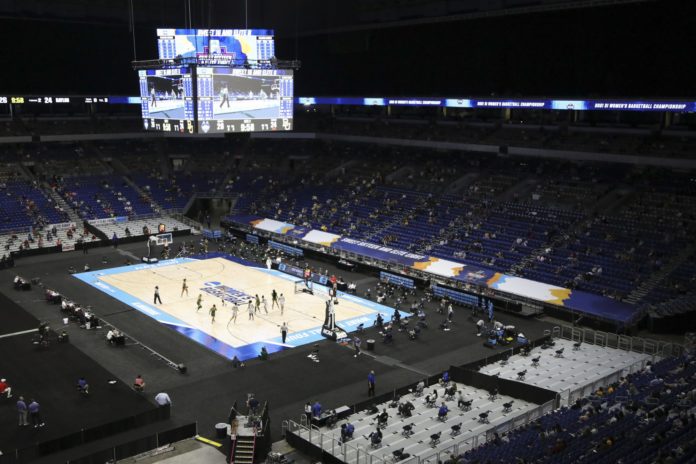
By DJ Ramirez | Sports Editor
In the aftermath of the backlash for the disparities between the setup of the men’s and women’s basketball tournaments, the NCAA hired Kaplan Hecker & Fink LLP to conduct an external review of gender equity issues within the organization. A spokesperson for Kaplan Hecker released a statement Wednesday morning about the investigation.
“In order to conduct our review, Kaplan Hecker has required complete independence and access to all resources, documents and other requested information, as well as the full cooperation of NCAA executives and NCAA staff,” the statement read.
The firm will be looking to meet with college athletes, coaches, athletics administrators, commissioners, presidents and others who could provide aid in the review. The investigation won’t just look into the differences found in the resources given to athletes in Indianapolis and San Antonio for the men’s and women’s basketball tournaments. It will also dive into the rest of the NCAA’s 90 national championships, 45 of which consist of women’s sports.
NCAA President Mark Emmert, who announced the hiring of Kaplan Hecker on Friday, held a press conference Wednesday morning as well and said the NCAA had to do better in its support of women’s sports.
“It is pretty self-evident that we dropped the ball in supporting our women’s athletes,” Emmert said in his opening statement. “We did not get to this moment because of what happened in San Antonio with the weight room or any issues, but we are. And now the most important thing to me is obviously to correct those things that happened in San Antonio — and we’re dealing with that and, I think, very effectively — but also we need to use it as a pivot point, as an inflection point to say what do we need to do better?”
In response to the review, Emmert and the NCAA received a letter from the Women’s Basketball Coaches Association pushing for more action and the formation of a commission to address gender inequity within college sports. According to the Boston Globe, the letter stated “the issues raised by the treatment of the teams in San Antonio are symptoms of a much larger attitude that women’s sports are second class to their men’s counterparts.”
Emmert said working with the WBCA in moving toward gender equity will be beneficial, not just when looking in issue related to the basketball tournaments, but also in other sports.
“Women’s basketball, like men’s basketball, those are the two marquee sports for NCAA championships. So we’ve got to get those things right. And our commitment — my commitment — to that is unequivocal,” Emmert said. “But we need to make sure if we’re dropping the ball in basketball that we’re not doing it in lacrosse or golf or tennis or any other sport that we have men’s and women’s tournaments in. It’s got to be gender equity across the board. So, the WBCA will be front and center in helping us sort out what we need to do here, and I look forward to working with them.”
On top of the Kaplan Hecker review, the NCAA is dealing with several other major discussions that could cause major changes in the governance of college sports. A case was presented to the Supreme Court on Wednesday regarding how antitrust laws apply to the NCAA and the payment of student athletes. Emmert made it clear that the case was not about whether student athletes should be paid to play or not but rather on how the law affects decision making in the governance of college sports.
“The case is not about pay for play. There’s a lot of belief that it is. The case is not about name, image and likeness, which a lot of people think it is,” Emmert said. “The case is about an antitrust issue that really focuses on who has the authority and the ability to make decisions around college sports in general.
“And so this question, regardless of what the Supreme Court does or doesn’t decide, won’t resolve whether or not student-athletes should be, in quotes, paid.”
Emmert, along with the majority of administrations from universities participating in collegiate sports, believe the relationship between the athlete and the school should remain as one of “university and student” and not “employer and employee.”
Furthermore, the issue of NIL also sits on the heels of a similar debate.
“The issue of NIL isn’t about whether student-athletes should be paid by universities,” Emmert said. “It’s whether or not they should have an opportunity to generate revenue from monetizing their own name, image and likeness. And I believe they absolutely should and have been clear about that and so have the schools.
“And so that’s why we’re in the midst of working with Congress to try and create a single rule for the entire country, rather than 50 individual state rules that will allow students to have that opportunity.”





